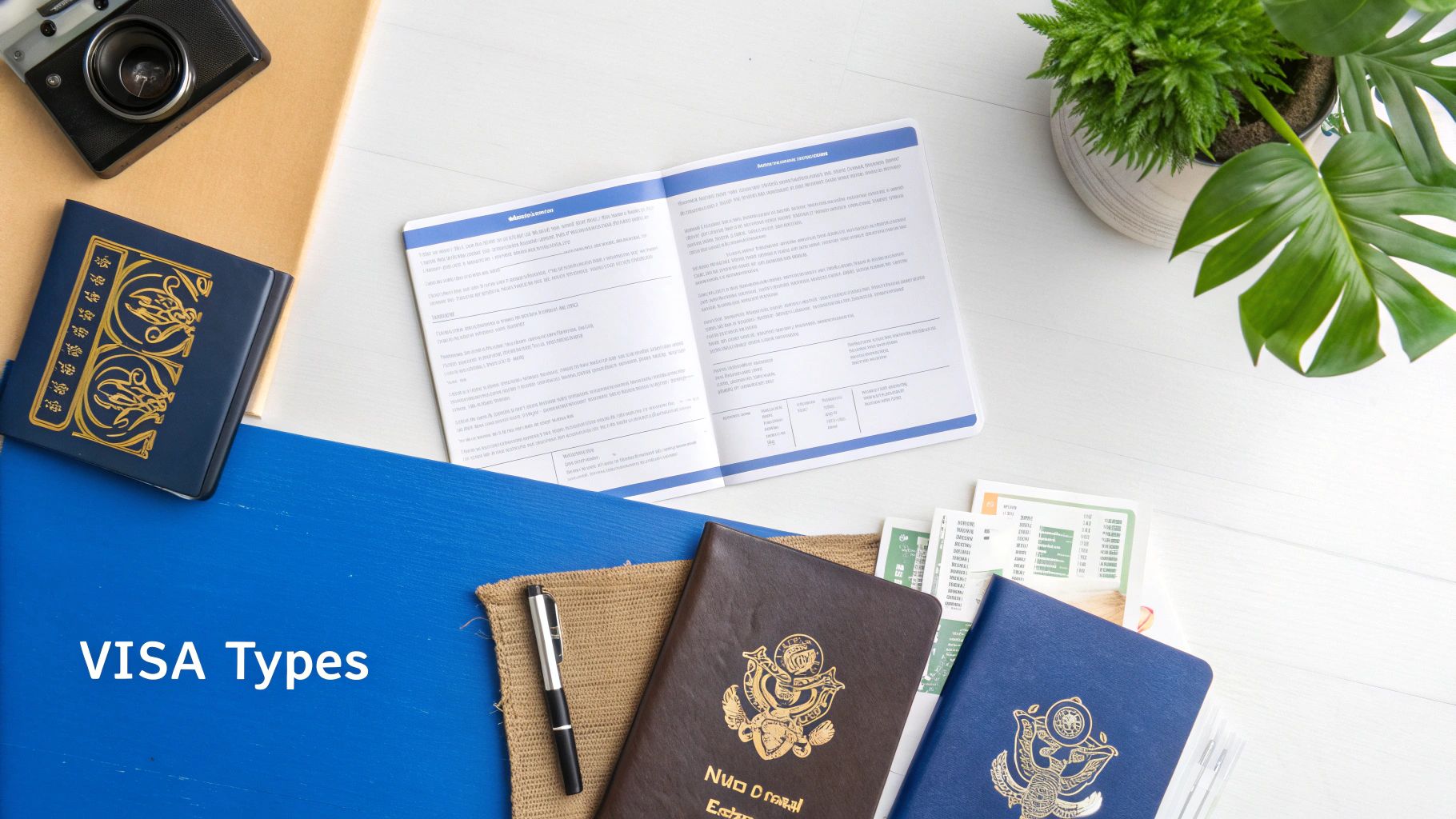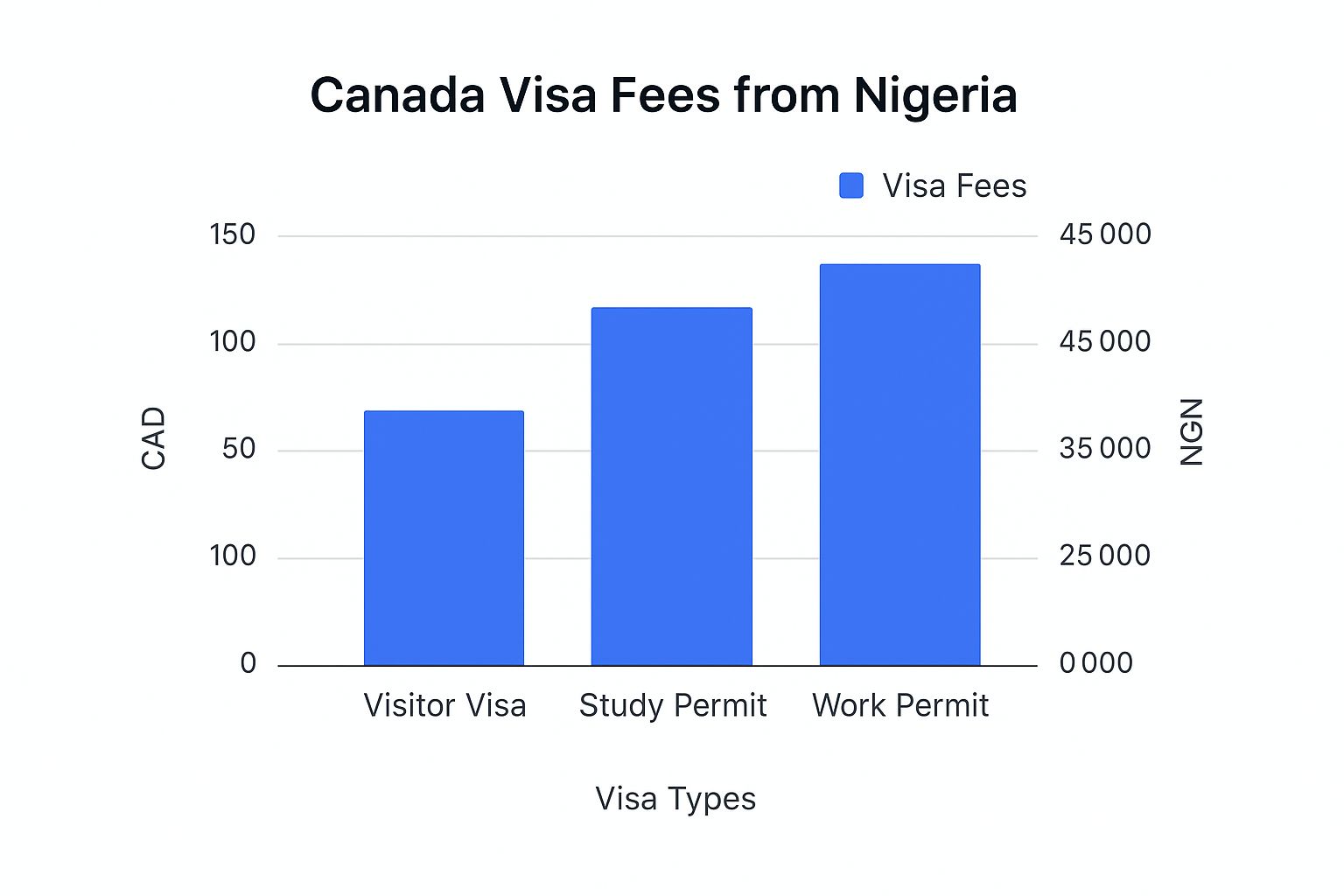How Much Is Canada Visa Fee in Nigeria? Complete Cost Guide

So, you're planning a trip to Canada and trying to figure out the visa costs. Let's break it down so there are no surprises.
When applying from Nigeria, you're looking at two primary government fees for a standard visitor visa. First is the application fee itself, which is CAD $100. Then, you have the biometrics fee, which costs CAD $85.
Add them together, and you get a total of CAD $185 per person. With the current exchange rate, this comes out to roughly NGN 210,900.
A Quick Look at Canada Visa Fees from Nigeria

Knowing the costs upfront is the first real step in your application journey. It’s helpful to think of the fees as two separate, non-negotiable parts of the process.
The application fee covers the administrative work—it’s what you pay the Canadian government to have an officer review your file. The biometrics fee pays for collecting your fingerprints and photograph at a Visa Application Centre (VAC). This is a mandatory step for security and identity verification.
Standard Visa Costs at a Glance
To make it crystal clear, here’s a table outlining the essential, non-refundable fees for a standard temporary resident visa application from Nigeria.
Standard Canada Visa Fees for Nigerian Applicants
| Fee Type | Cost in CAD | Estimated Cost in NGN |
|---|---|---|
| Application Processing Fee | CAD $100 | ~ NGN 114,000 |
| Biometrics Fee | CAD $85 | ~ NGN 96,900 |
| Total Per Person | CAD $185 | ~ NGN 210,900 |
Just a heads-up: the Naira amounts are estimates. They can and will fluctuate with the daily exchange rate, so it’s always a good idea to check the latest conversion before making a payment.
One Crucial Point: Both the application and biometrics fees are non-refundable. This is true whether your visa is approved or denied, which is why getting your application right the first time is so important.
While this covers the basics for a visitor visa, remember that the costs for study permits or work permits are different. For a complete look at the entire process, you should check out our detailed guide on how to relocate to Canada from Nigeria.
Decoding the Two Mandatory Visa Costs
When you’re applying for a Canadian visa from Nigeria, you'll come across two main fees that are absolutely non-negotiable. It’s really important to understand what each one is for, as it helps you budget properly and keeps things from getting confusing. Think of these as the two essential pillars of your application.

First up is the application processing fee. I like to call this the 'review fee'. This money goes directly to Immigration, Refugees and Citizenship Canada (IRCC), and it pays for an officer to actually sit down and go through your entire file. It’s a non-refundable charge that covers the administrative work, regardless of whether your visa gets approved or not.
The second compulsory cost is the biometrics fee. This is all about identity and security. You pay this fee to have your fingerprints and a digital photograph taken at a designated Visa Application Centre (VAC) in Nigeria. It's a critical step that allows the Canadian government to confirm you are who you say you are and run necessary security checks.
The Breakdown of Each Fee
Keeping these two costs separate in your mind makes the whole process clearer. One payment is for the evaluation of your paperwork, and the other is for the physical collection of your personal identification data.
According to the latest figures from the Canadian government, the standard temporary resident visa fee (which covers visitor visas) is CAD $100 per person. On top of that, the biometrics fee for Nigerian applicants is CAD $85. This brings your starting total to CAD $185 for a single applicant, before any other potential costs. It's always a good idea to verify the latest fee structures directly from the Canadian government just in case.
Key Takeaway: The application processing fee pays for the review of your case, while the biometrics fee pays for the collection of your identity data. Both are non-refundable and mandatory for Nigerian applicants.
By viewing them as two distinct but required steps, you can get a solid grip on the initial financial outlay. Understanding exactly how much a Canada visa fee is in Nigeria from the get-go ensures you're ready for the first, and most important, payments on your journey.
A Look at Visa Fees: Tourism, Study, and Work
Your reason for heading to Canada is the biggest factor determining your visa application cost. A simple holiday trip has one set of fees, while applying to study or work involves a different price structure. Getting a clear handle on these differences is the first step to budgeting properly for your application.
It's a common mistake to think all Canadian visas cost the same. They don't. The purpose of your visit—whether it's for a short holiday, pursuing a degree, or starting a new job—sets the specific application fee. This fee is completely separate from the biometrics fee, which is a standard cost you'll have to pay no matter which of these visas you apply for.
Side-by-Side Cost Comparison
Let's break down the main application fees for the most popular visa types Nigerians apply for. You can think of them like different service levels; a visitor visa requires a standard review, but study and work permits need a much deeper look into your plans, qualifications, and paperwork.
The table below gives you a clear financial snapshot of what to expect for each category.
Canada Visa Application Fees by Category for Nigerians
| Visa Type | Application Fee (CAD) | Biometrics Fee (CAD) | Total Fee per Person (CAD) |
|---|---|---|---|
| Visitor Visa (Tourism/Visit) | $100 | $85 | $185 |
| Study Permit | $150 | $85 | $235 |
| Work Permit | $155 | $85 | $240 |
As you can see, the base application fees for work and study permits are noticeably higher than for a standard visitor visa.
Here’s a simple breakdown of the main application fees, so the differences are crystal clear:

- Visitor Visa (Tourism): The application fee is CAD $100. This is your starting point if you're planning a holiday or visiting family and friends.
- Study Permit: The cost for this application goes up to CAD $150. This higher fee covers the more detailed assessment of your admission letter, financial proof, and study plan.
- Work Permit: This is the most expensive of the three, with an application fee of CAD $155. For a complete walkthrough of this process, our guide on how to apply for a work visa is a great resource.
Crucial Reminder: These figures only cover the application processing itself. Remember to add the CAD $85 biometrics fee to each total to figure out your final, upfront cost per person.
By knowing exactly which visa category fits your travel plans, you can accurately calculate your Canada visa fee and get your application started on the right foot, without any last-minute financial surprises.
How Family and Group Applications Affect Your Total Cost

Planning a family trip to Canada is exciting, but it’s easy to get confused about how the visa costs work for a group. Do you just multiply the fee by the number of people? Well, it's a bit of a "yes and no" situation, and the good news is there’s a key cost-saving measure for families.
When applying for visitor visas as a family, each person—adult or child—has to pay their own application processing fee. So, for a family of four, you'd pay four separate application fees of CAD $100 each. This part of the cost is straightforward.
But here’s where you catch a major break: the biometrics fee. Instead of everyone paying the individual CAD $85 fee, families get to take advantage of a capped rate.
Understanding the Family Biometrics Cap
The Canadian government has put a "family maximum fee" in place for biometrics. This means a family of two or more people applying for visitor visas at the same time will pay a maximum total of CAD $170 for biometrics, no matter how many of you there are.
Real-World Example: Let's say you're a family of four applying together. You'll pay $400 in application fees (4 x $100), but only $170 for biometrics, not the $340 it would have been if you paid individually. This little rule makes a huge difference in the overall cost for larger families.
This policy isn't just for families; it also applies to other groups applying for single-entry or multiple-entry visas. For instance, as of September 2024, a Nigerian attending a Canadian conference pays a CAD $100 processing fee (around NGN 114,000) and a CAD $85 biometrics fee (around NGN 96,900). If you are travelling with colleagues for the same event, the biometrics cap could apply. You can always check the latest details on these specific costs. Learn more about conference visa fees from Nigeria to Canada.
Alright, you've figured out the cost for your Canada visa application. Now comes the crucial part: paying for it without any hitches. Getting this step wrong can unfortunately stall your entire application, so let's walk through how to do it right.
The safest and most straightforward way to pay is directly on the official Immigration, Refugees and Citizenship Canada (IRCC) online portal. It's a secure system designed for this exact purpose.
You can use your Nigerian debit or credit cards, as long as they are enabled for international transactions. The most widely accepted cards are Visa and Mastercard.
How The Payment Actually Works
When you get to the payment section on the IRCC website, the fee will be shown and charged in Canadian Dollars (CAD). Don't worry about converting it yourself. Your Nigerian bank automatically handles the currency conversion, using whatever the exchange rate is on that particular day.
This is important to remember! The final amount you see debited from your account in Naira might be a little different from what you calculated earlier, simply because of daily exchange rate fluctuations.
A Few Practical Tips Before You Pay
Here’s a pro tip that can save you a lot of frustration: call your bank before you attempt the payment. Ask them to confirm two things: that your card is cleared for international online payments and what your daily spending limit is. A quick phone call can prevent the headache of a declined payment.
Alternatively, you can pay in person at a Visa Application Centre (VAC) here in Nigeria. VACs often provide other payment options, like using a POS terminal or even paying via a bank draft. However, it's always best to check with the specific VAC you plan to visit to confirm exactly which payment methods they accept.
For those of you applying for work, getting the payment right is just one piece of the puzzle. To see how this fits into the bigger picture, our detailed guide on the Canada work visa and permit process is a great resource.
Crucial Tip: Stick to official channels. Only pay on the official IRCC website or at an authorized VAC. Be very wary of third-party agents who offer to handle payments for you. This is a common tactic used in scams that could not only cost you your money but also expose your personal details.
Right, so you've got the main application fee sorted. That’s a great start, but it's really just one piece of the puzzle. Think of it like buying a ticket for a big event – the ticket gets you in the door, but you still need to budget for transport, food, and maybe some merch.
Applying for a Canadian visa from Nigeria is much the same. The official fees are what you pay to the Canadian government, but there are other necessary costs you'll pay to different organisations along the way. Planning for these upfront saves you a world of headache and last-minute panic. A solid budget covers everything, not just the headline price.
Common Additional Expenses to Plan For
Let's break down the other costs that often pop up, so you're not caught by surprise.
-
Medical Examination: For many visa types, especially longer stays, you'll need a medical exam. You can't just go to any doctor; it has to be one of IRCC's approved panel physicians in Nigeria. The cost for this can be quite significant, so it’s a major item to budget for.
-
Police Clearance Certificates: You’ll need to prove you have a clean record. This means getting a police clearance certificate, which involves a fee paid to the Nigerian Police Force.
-
Document Translation: Got a birth certificate, marriage certificate, or academic transcript that isn't in English or French? It will need to be translated by a certified professional, and that service comes at a cost.
-
VAC Service Charges: The Visa Application Centre (VAC) handles your biometrics and passport submission. While their main services are covered, they offer optional extras like courier return for your passport, SMS updates, or even assistance with filling out your forms. These all come with their own price tags.
Factoring these potential expenses into your budget from day one is your best move. It creates a financial cushion, letting you focus on putting together a perfect application instead of scrambling to find extra cash at a critical moment.
Got questions about the money side of your Canada visa application? You're not alone. Let's walk through some of the most common money-related questions Nigerian applicants ask, so you can plan your budget without any guesswork.
Is the Canada Visa Fee Refundable If My Application Is Denied?
Simply put, no. The fees you pay for processing your application and for biometrics are non-refundable, full stop.
Think of it like paying for a service. The fee covers the time and resources it takes for the Canadian government to review your file and process your data. This cost is incurred whether your application is approved or not. This is exactly why it's so important to double-check everything and submit the strongest application you possibly can—you want to make that investment count.
How Should I Handle the Fluctuating CAD to NGN Exchange Rate?
This is a smart question, as the exchange rate can be a real moving target. All the official visa fees are set in Canadian Dollars (CAD), but you'll be paying in Naira from your Nigerian bank account. Your bank does the conversion on the day you pay, using their own rate.
A Practical Tip: Before you're ready to pay, it's a good idea to check the current CAD-to-NGN rate to get a solid estimate. Just remember that the final amount debited from your account might be slightly different. The IRCC payment portal will confirm the exact CAD amount, but your bank has the final say on the exchange rate.
Do I Have to Pay for Biometrics Every Time I Apply?
Not always, and this is a great way to save a bit of money. Your biometrics—that's your fingerprints and photograph—are usually valid for a full 10 years.
If you've already given them for a visitor visa, study permit, or work permit in the past, they should still be on file. Before you pay that CAD $85 fee again, use the official IRCC status tool to check if your biometrics are still valid. A quick check could save you some cash.

Leave a Reply